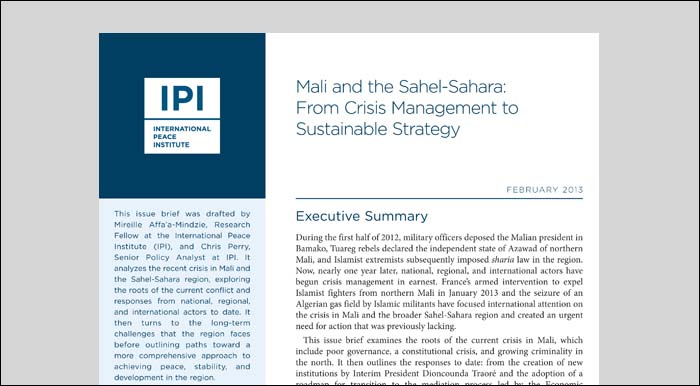 While the political and security crisis that erupted in Mali in 2012 seems to evolve daily, the underlying factors that threaten peace and human security in the Sahel region are not new. This issue brief analyzes the current crisis in Mali within the context of the Sahel-Sahara region as a whole. It discusses the roots of the crisis and details the various responses to date—including national, regional, and international actions—arguing that short-term crisis management will not be sufficient to bring peace and stability to the region.
While the political and security crisis that erupted in Mali in 2012 seems to evolve daily, the underlying factors that threaten peace and human security in the Sahel region are not new. This issue brief analyzes the current crisis in Mali within the context of the Sahel-Sahara region as a whole. It discusses the roots of the crisis and details the various responses to date—including national, regional, and international actions—arguing that short-term crisis management will not be sufficient to bring peace and stability to the region.
The multiplicity of actors, positions, and strategies seeking to resolve the crises in both Mali and the Sahel-Sahara region add new challenges to the multidimensional nature of the cross-border threats to peace, stability, and development in the region. While the French intervention in Mali has shown some initial success, responsibility for a long-term solution to the persistent insecurity in the country and the broader Sahel-Sahara region ultimately lies with the governments in the region.
Given the broad regional challenges of chronic underdevelopment, recurrent humanitarian crises, and proliferating networks of organized crime and terrorism, the authors suggest that a more comprehensive strategy will be needed, and they conclude that the integrated regional strategy currently being developed by the UN represents a step in the right direction. For countries in the region and the international community, the challenge remains to make the quantitative and qualitative investments that will ensure sustainable growth, strengthen state institutions, and facilitate broad popular participation as preconditions for long-term peace, stability, and development.
Read more about the authors:
Mireille Affa’a Mindzie
Chris Perry







